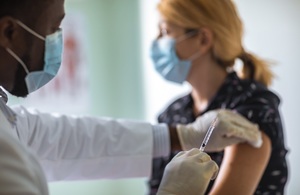Health Secretary urges G20 to protect clinical trial pioneers and recognise vaccines
On first international visit as Health and Social Care Secretary, he will push G20 countries to recognise vaccines and follow the UK’s clinical trial leadership.

- G20 countries must stand up for the rights of people taking part in life-saving COVID-19 vaccine clinical trials to protect future medical break-throughs, Sajid Javid will say
- G20 meetings in Rome will focus on recovering from COVID-19 and better preventing, detecting and responding to global health threats
The rights of vaccine clinical trial volunteers must be safeguarded to help protect everyone against future health crises, Health and Social Care Secretary Sajid Javid will tell G20 health leaders in Rome today (Sunday 5 September).
Attending his first international meeting of global health leaders since becoming Secretary of State, Sajid Javid will push for the UK’s COVID-19 vaccine clinical trial participants to have their vaccination status recognised globally.
This expands on the commitment made at the G7 Health Ministers’ Meeting, held in Oxford earlier this year, to protect the freedoms of those who helped pioneer medical advances and save lives around the world.
The UK has been a leading force in identifying new treatments and vaccines during the pandemic, with clinical trials resulting in the groundbreaking discovery of dexamethasone for treating serious COVID-19 cases – saving more than a million lives globally. It has also supported the scientific research, clinical trial and at-cost production of the Oxford/AstraZeneca vaccine which has now shipped tens of millions of doses globally.
Vaccine clinical trials
Many British citizens who took part in vaccine clinical trials to tackle COVID-19 have not had their status recognised for overseas certification purposes, because the vaccine they received is not yet approved for use in their destination country. This may mean they have to quarantine on arrival and cannot access certain settings where vaccine certification schemes are in place.
The government is committed to seeing a safe and sustainable return to international travel, and continuing to lead the way to make sure this is inclusive of clinical trial participants in the UK and beyond.
Under our amber arrivals policy, if a person is arriving from a country where the UK already exempts fully vaccinated travellers from quarantining, trial participants that have adequate proof of their participation in a trial will also be exempt from quarantining. We are proud to publicly recognise their vital role in the ongoing global efforts to combat the pandemic.
Health and Social Care Secretary Sajid Javid said:
The UK has been a trailblazer in clinical trials during the pandemic and we must harness that progress to fight future health threats.
If those who go above and beyond by taking part in clinical trials are disadvantaged in activities such as overseas travel, it threatens the future of medical breakthroughs and our ability to combat health threats.
Participants put themselves forward to benefit the global community and without them, the lives of millions of people worldwide would be in danger due to a lack of progress on new treatments and vaccines.
I will be urging my G20 health ministerial counterparts to stand up for the rights of those who have helped protect us all and ensure they can live their lives unhindered.
The UK is now embarking on a range of vital studies to monitor the impact of vaccines on pregnant women and teenagers as well as the impact of new vaccines, boosters and mixing types of vaccine. Recruitment is ongoing for these studies and the government is committed to ensuring people are not discouraged from participating and minimise the risk of drop out, by working hard to meet their needs.
Vaccines Clinical Trials Charter
At the UK-hosted G7 health meetings, representatives from some of the world’s largest democracies committed to a new Therapeutics and Vaccines Clinical Trials Charter, making it easier and quicker to share results from vaccine and therapeutic trials to tackle COVID-19 and prevent future health threats.
This will help deliver high-quality, reliable and comparable evidence from international clinical trials to speed up access to approved treatments and vaccines, benefitting people in the UK and globally. It will also include greater diversity of participants, including pregnant people and children.
The Health and Social Care Secretary will also speak to his ministerial counterparts about the need to improve vaccine confidence around the world, helping tackle dangerous misinformation and targeting communications through impactful routes for people from different backgrounds.
The government has expanded the Community Champions Scheme so that communities have trusted local leaders who can help answer questions about the vaccine and work with the NHS and public health teams to support local communities. Overall the UK has one of the highest vaccine uptake rates in the world and vaccine hesitancy has fallen among ethnic minority groups from 22% in the January to February survey to 9% at the most recent wave (May to June).
Over 91 million doses of the COVID-19 vaccine have been administered across the UK, with nearly 80% of everyone aged over 16 receiving both doses, including more than 50% of those aged 18 to 29 being double jabbed.
Background information
The G20 Health Ministers’ Meeting will be held in Rome on 5 and 6 September. It will focus on promoting strong cooperation, including towards ending the COVID-19 pandemic and supporting recovery, as well as work to better prevent, detect and respond to global health threats and emergencies.